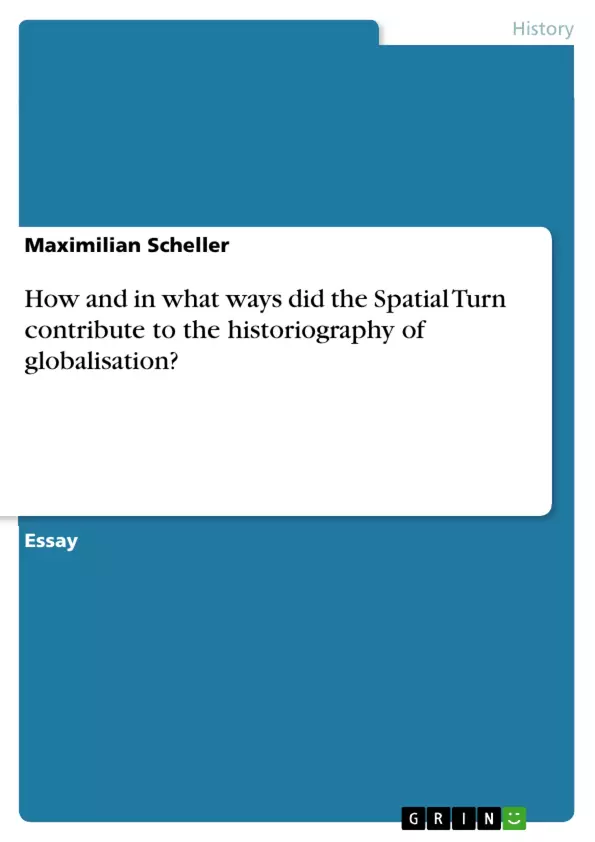The experiences of acceleration and globalisation could also be responsible for the "disappearance" of space as a category. The fact that the world and its dimensions are shrinking and that everything is, in a sense, merging and disappearing into one another through a constant acceleration of events, has given rise to the misunderstanding that space has lost its meaning. Especially in globalisation research, therefore, the urgency of the new concept of space became apparent. With events such as the 9/11 terrorist attacks, the vulnerability of physical space emerged as a kind of "master narrative". From then on, globalisation was no longer just the global networking of goods and knowledge but also revealed a more profoundly expanded field in which not only physical space plays a role. However, this requires the right scaling in the form of the right “altitude”, or rather the right spatial framework. Jürgen Osterhammel, one of the most influential global historians from Germany, puts it in a nutshell with his question: "How high "into the air" do you have to rise to gain which overview?" He describes this as undoubtedly one of the most important methodological questions that historians must also address. These questions were answered by the Spatial Turn, which was launched by several human geographers at the end of the twentieth century. This ensured that historical scholarship, too, became more concerned with space as an analytical tool of historiography – especially for understanding globalisation.
Inhaltsverzeichnis (Table of Contents)
- How and in what ways did the Spatial Turn contribute to the historiography of globalisation?
- The Background of Globalisation Studies in History
- The New Approach of the Spatial Turn
- The Contribution of the Spatial Turn to Globalisation Studies in History
- Critiques of the Post-Spatial-Turn Approaches
- Conclusion
Zielsetzung und Themenschwerpunkte (Objectives and Key Themes)
This essay explores the influence of the Spatial Turn on the historiography of globalization. It examines how the Spatial Turn contributed to understanding the multifaceted nature of global processes and challenged traditional approaches rooted in methodological nationalism and Eurocentrism.
- The limitations of traditional historical scholarship in understanding globalization
- The emergence of the Spatial Turn and its key concepts
- The application of the Spatial Turn in globalisation studies
- The impact of the Spatial Turn on understanding global processes
- Critiques of the Spatial Turn and its limitations
Zusammenfassung der Kapitel (Chapter Summaries)
- The first chapter provides a historical overview of globalization studies, highlighting the dominance of national history and the shift towards transnational perspectives. It also introduces the challenges posed by the term "globalization" and its potential to obscure the diverse and layered nature of global processes.
- The second chapter delves into the concept of the Spatial Turn, examining how it challenged traditional understandings of space and introduced new perspectives on spatial relations. This chapter explores the notion of competing spatial frames and the rejection of methodological nationalism and Eurocentrism.
- The third chapter focuses on the contribution of the Spatial Turn to globalisation studies in history. It explores how the Spatial Turn provided new tools for analysing global processes, particularly by emphasizing the interconnections between social, historical, and spatial dimensions.
- The fourth chapter briefly reviews critiques of the Spatial Turn, acknowledging both its strengths and limitations. It addresses concerns regarding the potential for oversimplification and the need for further refinement of the spatial framework.
Schlüsselwörter (Keywords)
The key terms and concepts explored in this essay include globalization, historiography, Spatial Turn, methodological nationalism, Eurocentrism, transnational history, space, spatiality, Thirdspace, global processes, competing spatial frames, and critical thirding-as-othering.
Frequently Asked Questions
What is the "Spatial Turn" in history?
The Spatial Turn is a paradigm shift in the humanities and social sciences that emphasizes space as a primary analytical category, rather than just a neutral stage for historical events.
How did the Spatial Turn impact globalization studies?
It challenged the idea that globalization leads to the "disappearance of space." Instead, it showed that globalization creates complex, layered, and competing spatial frameworks beyond national borders.
What is "methodological nationalism"?
Methodological nationalism is the assumption that the nation-state is the natural and only container for social and historical processes. The Spatial Turn seeks to overcome this limitation.
What does Jürgen Osterhammel mean by "altitude" in history?
He uses the metaphor of "rising into the air" to describe the methodological choice of scale. Different heights (or spatial frames) provide different overviews and insights into global processes.
What are the critiques of the Spatial Turn?
Critiques often address the potential for oversimplification of spatial relations and the need for more precise definitions to avoid making "space" an empty buzzword.
- Quote paper
- Maximilian Scheller (Author), 2023, How and in what ways did the Spatial Turn contribute to the historiography of globalisation?, Munich, GRIN Verlag, https://www.grin.com/document/1372286



